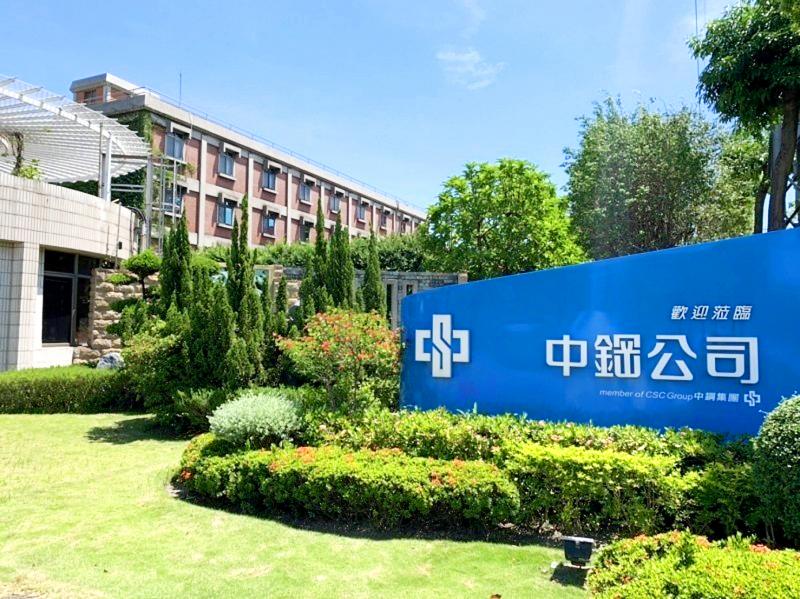China Steel Corp (CSC, 中鋼) yesterday said it would raise prices for domestic deliveries by 1.32 percent next month and for next quarter to reflect higher manufacturing costs and rising steel demand.
Strong global economic recovery, a bullish prediction of Taiwan’s GDP growth of 5.4 to 6 percent, and large infrastructure projects in the US, China, Europe and India have set the tone for a strong steel market for the coming seasons, but there is still uncertainty due to the COVID-19 pandemic and logistics issues, the nation’s largest steelmaker said.
“We are heading into the fourth quarter, traditionally the strong quarter for steel demand,” the company said in a statement. “We expect demand to keep surging, but global logistic logjams and the resurgence of COVID-19 in Southeast Asia could affect some downstream demand.”

Photo courtesy of China Steel Corp
If there is a disruption in downstream demand, the steelmaker would stagger the release of steel, it said.
“The strength of Taiwanese manufacturing is not in doubt,” it added.
Next month, electro-plated steel roll prices would increase by NT$500 per tonne, the firm said.
For the fourth quarter, prices of high-carbon rods would also rise by NT$500 per tonne, it said.
Prices of steel plates, hot-rolled steel, hot-rolled steel rolls, electroplated steel rolls and automotive steel would increase by NT$1,500 per tonne, while rod material prices would rise by NT$1,000 per tonne, it said.
Due to the implementation of decarbonization policies in some countries around the world and the strict restrictions on crude steel production in China ahead of next year’s Beijing Winter Olympics, the demand for steel is expected to remain tight, the firm said.
Steel mills undergoing repairs also affects supply, it said.
“Starting from September, plants in Europe, the US and Asia entered their annual maintenance period, including almost half of all blast furnaces in China’s steelmaking hub of Tangshan,” the company said.
US steel prices keep breaking records, with hot-rolled steel priced at US$2,100 per tonne and cold-rolled steel nearing US$2,400 per tonne, it said.
Moreover, Japan’s Nippon Steel Corp has reached a long-awaited deal with Toyota Motors Co to raise the price of steel by US$182 per tonne, the biggest price increase in 10 years, CSC said.
The agreement would have a knock-on effect on prices for home appliances, construction and shipbuilding, it added.
Although iron ore prices fell slightly, coking coal prices rose to US$350 per tonne, a 10-year high, it said.
Prices of other steelmaking materials such as electrolytic manganese are also spiking, it said.
“The overall cost of raw materials remains high, which will support international steel prices,” the company said.
As global carbon neutrality efforts take shape, most industrialized countries are putting plans for carbon taxes or the trading of carbon credits, it said.
“The era of expensive steel is upon us,” the company said.

In Italy’s storied gold-making hubs, jewelers are reworking their designs to trim gold content as they race to blunt the effect of record prices and appeal to shoppers watching their budgets. Gold prices hit a record high on Thursday, surging near US$5,600 an ounce, more than double a year ago as geopolitical concerns and jitters over trade pushed investors toward the safe-haven asset. The rally is putting undue pressure on small artisans as they face mounting demands from customers, including international brands, to produce cheaper items, from signature pieces to wedding rings, according to interviews with four independent jewelers in Italy’s main

Japanese Prime Minister Sanae Takaichi has talked up the benefits of a weaker yen in a campaign speech, adopting a tone at odds with her finance ministry, which has refused to rule out any options to counter excessive foreign exchange volatility. Takaichi later softened her stance, saying she did not have a preference for the yen’s direction. “People say the weak yen is bad right now, but for export industries, it’s a major opportunity,” Takaichi said on Saturday at a rally for Liberal Democratic Party candidate Daishiro Yamagiwa in Kanagawa Prefecture ahead of a snap election on Sunday. “Whether it’s selling food or

CONCERNS: Tech companies investing in AI businesses that purchase their products have raised questions among investors that they are artificially propping up demand Nvidia Corp chief executive officer Jensen Huang (黃仁勳) on Saturday said that the company would be participating in OpenAI’s latest funding round, describing it as potentially “the largest investment we’ve ever made.” “We will invest a great deal of money,” Huang told reporters while visiting Taipei. “I believe in OpenAI. The work that they do is incredible. They’re one of the most consequential companies of our time.” Huang did not say exactly how much Nvidia might contribute, but described the investment as “huge.” “Let Sam announce how much he’s going to raise — it’s for him to decide,” Huang said, referring to OpenAI

The global server market is expected to grow 12.8 percent annually this year, with artificial intelligence (AI) servers projected to account for 16.5 percent, driven by continued investment in AI infrastructure by major cloud service providers (CSPs), market researcher TrendForce Corp (集邦科技) said yesterday. Global AI server shipments this year are expected to increase 28 percent year-on-year to more than 2.7 million units, driven by sustained demand from CSPs and government sovereign cloud projects, TrendForce analyst Frank Kung (龔明德) told the Taipei Times. Demand for GPU-based AI servers, including Nvidia Corp’s GB and Vera Rubin rack systems, is expected to remain high,